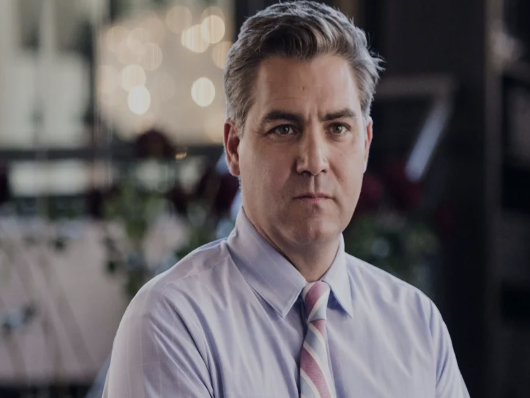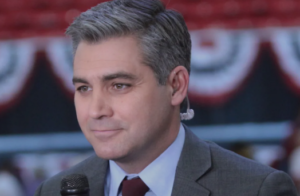
jim acosta
In a constantly shifting American media landscape, Jim Acosta stood out for his bold reporting and tough questioning, from White House clashes to front-line coverage of major national events—highlighting the vital role of journalism in a modern democracy.
Early Life and Education
On the 17th of April 1971, Jim Acosta was born in Washington, D.C., ready to blossom into the world. Acosta grew up in Virginia. With his father of Cuban origin, Acosta grew in such a setting that gave a very broad view of politics, immigration, and world affairs. He graduated from James Madison University in 1993, majoring in mass communications with a minor in political science. This mixture of interests would serve as a backdrop to Acosta’s life in political journalism.
Climbing the Ranks in Journalism
Acosta started with local radio and television stations. He worked at WBIR-TV, located in Knoxville, Tennessee, then KTVT-TV, located in Dallas. Featuring undying passion and a lot of fighting spirit, Acosta finally moved into the great national limelight. He joined CBS News in 2001 to cover events such as the 9/11 attacks and the Iraq War.
In 2007, he moved to CNN, the turning point in his career. He started as a correspondent and quickly stood out for his sharp questioning, leading to his promotion as national political correspondent in 2012 and Chief White House Correspondent in 2018 during the Trump administration.
Jim Acosta and the Trump Administration
Acosta rose to national attention during the Trump administration, with his aggressive, persistent questioning leading to several high-profile clashes with the President and White House press secretaries.
The White House revoked Acosta’s press pass in November 2018 after a clash with Trump and disputed claims that he touched a staffer—claims journalists and media watchdogs widely criticized. CNN soon initiated a suit against the administration, citing infringements of the First- and Fifth- Amendment rights. The battle finally ended with the restoration of Acosta’s credentials, marking a landmark moment in the struggle for press freedom in America.
The confrontation forever emblazoned the name of Acosta as a defender of journalistic integrity and a lightning rod in American media culture. To his supporters, he was defending the rights of journalists; to his critics, he was grandstanding and practically joining the story instead of reporting it.
Reporting Style and Philosophy
Jim Acosta’s journalistic approach very aggressive mostly when it comes to the coverage of those in power. He works with the conviction that journalists shouldn’t just passively record events but act instead in questioning or challenging the narratives they encounter. Thus, this confrontational style has served to open sore discussions about the functioning of the press vis-a-vis democracy.
Acosta once said journalism isn’t about pleasing everyone, but telling the truth—even when uncomfortable—a principle that guided his work through politically turbulent times and attacks on legitimate news as ‘fake’.

Books and Public Speaking
Jim Acosta is not just a television journalist, he is also a published author. In 2019, Acosta published The Enemy of the People, a memoir and critique of the Trump administration’s attacks on the media, blending personal experience with broader concerns about press freedom.
Acosta described in his memoir the emotional toll of being labeled “fake news” and “enemy of the people,” labels so frequently weaponized by President Trump. The book struck a chord with journalists and readers alike who feared the normative erosion of democratic values.
Acosta also speaks frequently at conferences on journalism, at universities, and other media-related forums. These occasions give him the opportunity to speak about topics ranging from the free press, misinformation in the digital age, to the changing engagements of the media from political institutions.
Transition to Weekend Anchor and Commentary
In 2021, CNN reassigned Jim Acosta to the position of weekend anchor and domestic correspondent. The common speculation was that it was a form of demotion, while others purported that this was an opportunity for Acosta to extend his influence beyond just political reporting. click here
As an anchor, Acosta has continued with his drubbing style, full of intellect and high volumes. He has moved at least some distance into political commentary pertaining to-closer and elections and government, so-to-speak, accountability. His analyses very often demonstrate and serve the dangers posed by political extremism and threats to democracy.
Jim Acosta and the Future of Journalism
Journalists entering the arena at such times bear immense responsibility, as partisan channels often place journalism in the position of being on one side or the other, and thus of misinformation. His critics would label him biased; Acosta insists, however, that fact is not partisan and that truth should never be aligned with political prejudice.
Acosta is happy to be a lightning rod: it IS necessary for the bona fide defense of freedom of the press. He has said, “Being attacked by a president is nothing compared to what many reporters face around the world-imprisonment, censorship, even death.” In his importance, he reminds us that journalism is still paramount when democracy is under threat.
International Perception and Legacy
Although Jim Acosta has focused primarily on American journalism, his influence has resonated globally. In countries like India, where press freedom faces growing scrutiny, journalists and academics have studied Acosta’s bold reporting as a case study in media ethics and integrity.
Several journalistic schools of thought in India refer to his work when debating political reporting, freedom of the press, and the ethics of confrontational journalism. He is cited as an example of someone who has stood by democratic principles in the face of immense pressure.
His legacy, as it would be, is also still being written, with the emphasis on holding authorities accountable and ensuring that the press remains a pillar of democratic society.
Criticism and Controversy
Of course, there is no journalist of Jim Acosta’s stature that goes uncriticized. Some media experts state that his confrontational manner sometimes straddles the line between journalist and activist. Conservative critics have especially accused him of elevating himself through his platform and of having the negative effect of deepening the political divide.
“Acosta has pushed back against such accusations by reinforcing his commitment to journalism, especially when elected officials or falsehoods threaten democratic norms. He stated that journalism isn’t meant to make people feel good, but to present facts and inform the public.”
Jim Acosta’s Influence in the Digital Age
Jim Acosta generally enjoys high social media visibility, with its correspondingly large following. With his social media presence on platforms including X (formerly Twitter), he disburses news updates, discusses and dissects political claims, and speaks directly with the public. An era in which traditional media competes with influencers, bloggers, and AI-generated content sees Acosta defending the relevance of voice and culture with direct views about journalistic responsibility.
Acosta’s digital strategy strengthens his role in fighting disinformation and connects with audiences who increasingly rely on online news over TV.
Why Jim Acosta Matters
Jim Acosta is more than just a CNN reporter; he is considered a symbol of resistance in an era where truth is under attack. His life exemplifies challenging authority, asking tough questions, and standing firm under political pressure.
For aspiring journalists worldwide, Acosta’s story highlights integrity, resistance, and the press’s role in democracy. Love him or not, his influence on modern journalism is undeniable.
In a world split by polarization and misinformation, voices like Jim Acosta’s help keep the truth loud and uncompromised.





